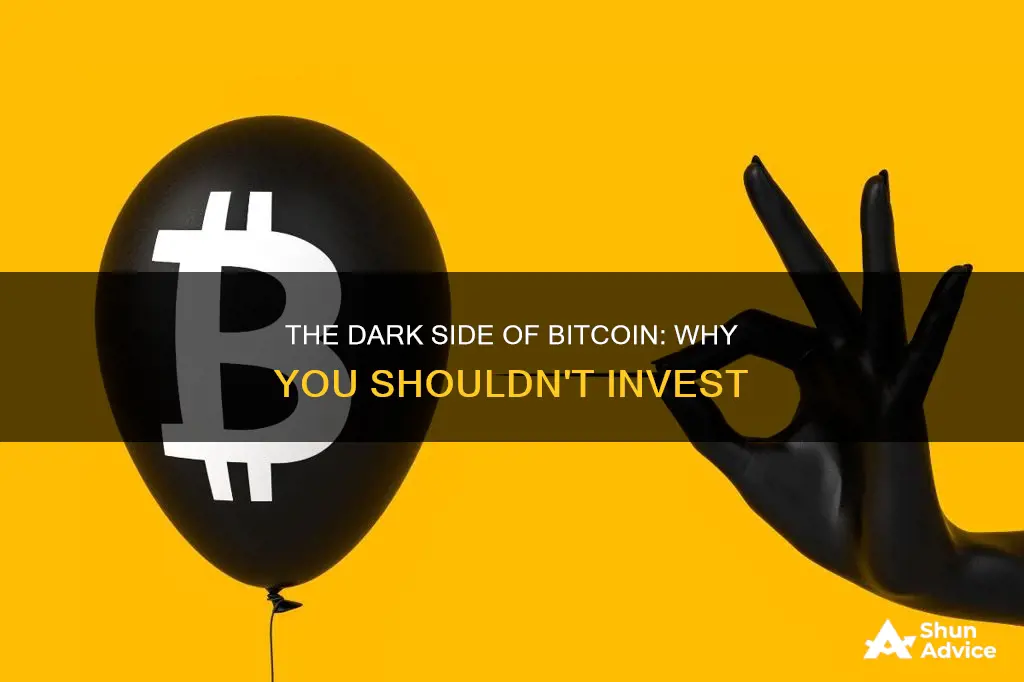
Bitcoin is a risky investment. It's highly volatile, irreversible, and vulnerable to fraud and cybercrime. The market is not transparent, and it's not clear how regulators will approach it in the future. It's also not backed by any meaningful value and is not a reliable medium of exchange. It's also not insured by the Federal Deposit Insurance Corporation or the Securities Investor Protection Corporation.
| Characteristics | Values |
|---|---|
| Volatility | Daily fluctuations of 5% are ordinary, with occasional double-digit price moves. |
| Inefficiency | It takes 10 minutes to process a single transaction. |
| Energy Usage | It takes more energy to run bitcoin than it does to power the entire country of Poland. |
| Criminal Activity | Bitcoin is often used for illicit activities, such as ransomware attacks and dark web purchases. |
| Lack of Intrinsic Value | Bitcoin is not backed by any meaningful value. |
| Regulatory Risk | Regulators have not clarified their approach to regulating cryptocurrencies. |
| Consumer Protections | Consumer protections are minimal or non-existent. |
| Irreversible Transactions | Transactions cannot be reversed. |
| Regulatory Classification | The IRS treats cryptocurrencies as property, not currency. |
What You'll Learn

Bitcoin's value is extremely volatile
Supply and Demand
Bitcoin's price, like most commodities, is heavily influenced by supply and demand. With a limited supply of 21 million coins, the closer the circulating supply gets to this limit, the higher the prices are likely to climb. As big financial players compete for ownership in a dwindling supply environment, Bitcoin's price will likely fluctuate in response to their actions.
Investor Sentiment and Media Influence
Investor sentiment and media influence also play a crucial role in Bitcoin's volatile price movements. Speculation about price movements, news, and media outlets' predictions create investor concerns, leading to price fluctuations. Fear and greed are primary drivers of Bitcoin's volatility, as investors fear missing out on significant price swings.
Regulatory Changes
Regulatory changes and government agency views on cryptocurrency can also impact Bitcoin's price. For example, China's crackdown on cryptocurrency transactions and mining in 2021 caused a significant drop in Bitcoin's price.
Actions of "Bitcoin Whales"
"Bitcoin whales," or investors with large BTC holdings, can influence the market value. If these whales were to suddenly liquidate their Bitcoin holdings, it could trigger a panic among other investors, leading to a rapid and significant drop in prices.
Limited History and Infancy
Bitcoin is still in its infancy compared to traditional assets like gold and fiat currencies. It is in the price discovery phase, and its value is yet to stabilize as investors, users, and governments work through the initial growing pains and concerns.
Bitcoin's extreme volatility makes it a risky investment. While it has the potential for high returns, investors should be prepared for significant downturns and understand that there is a possibility of losing their entire investment.
The Ultimate Guide to Investing in Dogecoin via Cash App
You may want to see also

It's not a viable medium of exchange
Bitcoin is not a viable medium of exchange due to its high volatility and deflationary nature. Its value fluctuates wildly, making it unreliable for everyday transactions. For example, in 2022, Bitcoin's value fell by over 75% from its all-time high, and there were drops of 50% or more in 2021 and 2022.
The instability of Bitcoin's value makes it impractical for commerce. People are more likely to denominate commerce in a stable currency like the US dollar and only settle in Bitcoin. This is similar to how less stable countries use dollars or euros for transactions, settling in the local currency.
Additionally, Bitcoin's deflationary nature, with a fixed supply of 21 million digital coins, can be problematic. Unlike fiat currencies, where central banks can increase the money supply to stimulate the economy, Bitcoin's scarcity can lead to hoarding and reduced spending, impacting its effectiveness as a medium of exchange.
The high transaction fees associated with Bitcoin further hinder its viability as a medium of exchange. It takes a median transaction fee of about $20 and around 10 minutes to validate most transactions, making it cumbersome and expensive for everyday use.
Lastly, Bitcoin's association with illicit activities and recent government successes in tracking and retrieving Bitcoin ransom payments have raised doubts about the security and anonymity of Bitcoin transactions. These factors contribute to Bitcoin's reputation as a speculative investment rather than a reliable medium of exchange.
The Rich and Bitcoin: A Lucrative Investment Strategy?
You may want to see also

It's not backed by anything
Bitcoin is not backed by anything physical, like gold or silver, or by a central entity that enforces its value. Instead, its value is derived from consumer confidence, much like the U.S. dollar and other fiat currencies. The value of fiat money is set by changes in supply and demand, as well as the strength of the government behind it. Since governments only accept payment of taxes in fiat currency, and tax evasion is illegal, their value is also maintained by required tax payments.
While fiat currencies are not formally backed by anything, we tend to buy into them with the confidence that they will be accepted elsewhere in exchange for goods and services. Essentially, our confidence in fiat currencies generates purchasing power and, therefore, value. The same is true for Bitcoin. Despite its lack of physical backing, Bitcoin currently has an individual unit value of around $30,000 and a total market capitalization of over $625 billion, clearly demonstrating that it is considered valuable by a large number of people.
The rest of Bitcoin's value can be attributed to the fact that it was the first successful monetary system to operate without a centralized entity pulling the strings. This means that its supply cannot be forcefully inflated, it cannot be easily confiscated like gold was during the 1930s, and it offers a level of financial freedom that few (if any) fiat currencies can match. Additionally, Bitcoin has been shown to have utility value, with thousands of merchants now accepting it as payment for goods and services. In El Salvador and the Central African Republic, Bitcoin has even been adopted as legal tender.
However, it is important to note that Bitcoin is still some way from the mainstream. Until mass adoption takes place, confidence in Bitcoin will ultimately not be as high or as widespread as confidence in established fiat currencies. As a result, the level of confidence in a currency can be indicated or even preserved by its level of usage around the world.
Bitcoin's Global Love Affair: Country-Wise Investment Insights
You may want to see also

It's not insured by the Federal Deposit Insurance Corporation
Bitcoin is not insured by the Federal Deposit Insurance Corporation (FDIC). The FDIC is an independent agency created by the US Congress to maintain stability and public confidence in the nation's financial system. It insures deposits, examines and supervises financial institutions for safety, soundness, and consumer protection, and manages receiverships.
By federal law, the FDIC only insures deposits held in insured banks and savings associations in the unlikely event of their failure. The FDIC does not insure assets issued by non-bank entities, including crypto companies. This means that if a crypto platform fails, the FDIC will not cover any losses.
The lack of FDIC insurance for Bitcoin and other cryptocurrencies is a significant risk for investors. It means that there is no protection or recourse if something goes wrong with a crypto investment. This is in stark contrast to traditional financial products, which typically offer insurance protection from the FDIC.
The absence of FDIC insurance highlights the speculative nature of Bitcoin and the lack of regulatory safeguards in the crypto space. Investors in Bitcoin are exposed to a higher level of risk compared to those investing in traditional financial products. It is important for individuals considering investing in Bitcoin to understand this risk and the potential impact on their financial well-being.
Overall, the lack of FDIC insurance for Bitcoin underscores the volatile and unregulated nature of the cryptocurrency market. Investors should carefully consider their risk tolerance and the potential consequences of losing their investment before deciding to invest in Bitcoin or other cryptocurrencies.
Coinbase Pro: A Safe Bet for Crypto Investors?
You may want to see also

It's susceptible to market manipulation
Bitcoin is susceptible to market manipulation due to its decentralised nature and lack of regulation by central authorities. This makes it vulnerable to the actions of large players who can influence its value for personal gain. An example of this was seen in the speculative trading around the launch of Bitcoin futures contracts on the Chicago Mercantile Exchange (CME) in December 2017.
A study by Fratrič et al. (2022) found that fraudulent actions by a trader or group of traders can cause significant disturbances to the market, directly influencing asset prices or indirectly by misleading other market participants. The study focused on an alleged Bitcoin price manipulation event that occurred between 2017 and early 2018. It was found that the presence of a fraudulent agent was essential to the significant increase in Bitcoin's price during this period.
The success of market manipulation strategies depends on the response of the market. Fratrič et al. further investigated the connection between liquidity and manipulation efficiency, finding that increasing liquidity near the mid-price made it more difficult for fraudulent traders to match their buy orders with sell orders at high limit prices, thus reducing the impact of their actions on the market price.
The study also highlighted the regulatory implications of its findings, suggesting that stablecoin providers should be required to prove their capital more frequently to protect customers and other market participants from pump-and-dump schemes.
Gemini Bitcoin Investing: A Step-by-Step Guide
You may want to see also
Frequently asked questions
Bitcoin is highly volatile and subject to significant price fluctuations. Its value can increase or decrease by double-digit percentages in a single day.
Bitcoin is not backed by any government or central bank and is not widely accepted as a medium of exchange. It is also not insured by the Federal Deposit Insurance Corporation or the Securities Investor Protection Corporation, meaning there is no protection for investors if things go wrong.
The future regulatory environment for Bitcoin is uncertain. It is also unclear whether Bitcoin will be able to maintain its long-term value in terms of purchasing power.
Yes, Bitcoin relies on massive computing power, which has a huge environmental impact. It also has been associated with illegal activities, such as ransomware attacks and dark web purchases.







